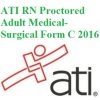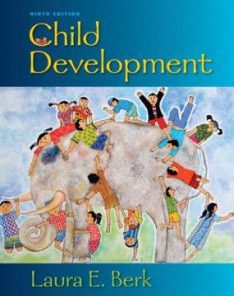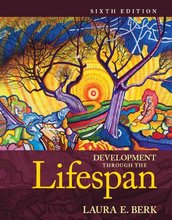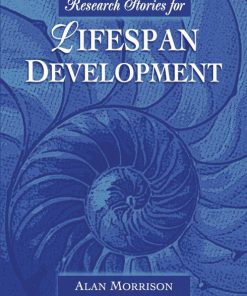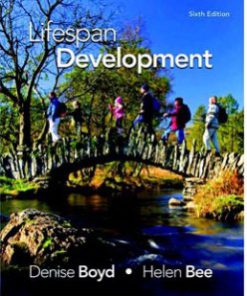Test Bank for Exploring Lifespan Development 4th Edition by Berk
$35.00 Original price was: $35.00.$26.50Current price is: $26.50.
Test Bank for Exploring Lifespan Development 4th Edition by Berk
This is completed downloadable of Test Bank for Exploring Lifespan Development 4th Edition by Berk
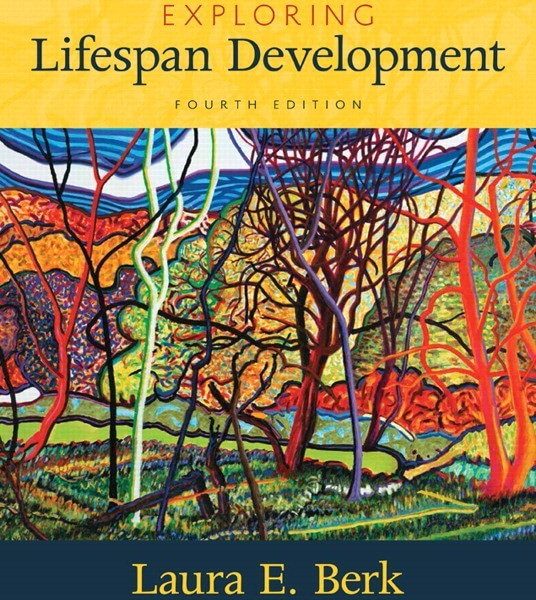
Product Details:
- ISBN-10 : 9780134419701
- ISBN-13 : 978-0134419701
- Author: Laura E. Berk
Unparalleled Among Human Development Texts ― In a Class by Itself
Exploring Lifespan Development, Fourth Edition, the shorter, essentials version of Development Through the Lifespan, Seventh Edition, covers the same topics and contains the same number of chapters, but presents only the essential information, with an exceptionally strong emphasis on applications. Exploring Lifespan Development also includes all the great features Berk’s texts are known for ― an engaging writing style, exceptional multicultural and cross-cultural focus, rich examples, the most up-to-date research, and practical applications that help students relate the subject to their personal and professional lives.
Table of Content:
- PART I THEORY AND RESEARCH IN HUMAN DEVELOPMENT
- chapter 1 History, Theory, and Research Strategies
- A Scientific, Applied, and Interdisciplinary Field
- Basic Issues
- Continuous or Discontinuous Development?
- One Course of Development or Many?
- Relative Influence of Nature and Nurture?
- The Lifespan Perspective: A Balanced Point of View
- Development Is Lifelong
- Development Is Multidimensional and Multidirectional
- Development Is Plastic
- Development Is Influenced by Multiple, Interacting Forces
- BIOLOGY AND ENVIRONMENT Resilience
- Scientific Beginnings
- Darwin: Forefather of Scientific Child Study
- CULTURAL INFLUENCES The Baby Boomers Reshape the Life Course
- The Normative Period
- The Mental Testing Movement
- Mid-Twentieth-Century Theories
- The Psychoanalytic Perspective
- Behaviorism and Social Learning Theory
- Piaget’s Cognitive-Developmental Theory
- Recent Theoretical Perspectives
- Information Processing
- Developmental Neuroscience
- Ethology and Evolutionary Developmental Psychology
- Vygotsky’s Sociocultural Theory
- Ecological Systems Theory
- Comparing Theories
- Studying Development
- Common Research Methods
- General Research Designs
- CULTURAL INFLUENCES Immigrant Youths: Adapting to a New Land
- Designs for Studying Development
- Ethics in Lifespan Research
- Summary
- Important Terms and Concepts
- PART II FOUNDATIONS OF DEVELOPMENT
- chapter 2 Genetic and Environmental Foundations
- Genetic Foundations
- The Genetic Code
- The Sex Cells
- Boy or Girl?
- Multiple Offspring
- Patterns of Gene–Gene Interactions
- Chromosomal Abnormalities
- Reproductive Choices
- Genetic Counseling and Prenatal Diagnosis
- SOCIAL ISSUES: HEALTH The Pros and Cons of Reproductive Technologies
- Adoption
- Environmental Contexts for Development
- The Family
- Socioeconomic Status and Family Functioning
- Poverty
- Affluence
- Beyond the Family: Neighborhoods and Schools
- The Cultural Context
- Understanding the Relationship Between Heredity and Environment
- The Question, “How Much?”
- The Question, “How?”
- BIOLOGY AND ENVIRONMENT The Tutsi Genocide and Epigenetic Transmission of Maternal Stress to Childre
- Summary
- Important Terms and Concepts
- chapter 3 Prenatal Development, Birth, and the Newborn Baby
- Prenatal Development
- Conception
- Germinal Period
- Period of the Embryo
- Period of the Fetus
- Prenatal Environmental Influences
- Teratogens
- Other Maternal Factors
- SOCIAL ISSUES: HEALTH The Nurse–Family Partnership: Reducing Maternal Stress and Enhancing Child D
- The Importance of Prenatal Health Care
- Childbirth
- The Stages of Childbirth
- The Baby’s Adaptation to Labor and Delivery
- Assessing the Newborn’s Physical Condition: The Apgar Scale
- Approaches to Childbirth
- Natural, or Prepared, Childbirth
- Home Delivery
- Medical Interventions
- Fetal Monitoring
- Labor and Delivery Medication
- Cesarean Delivery
- Preterm and Low-Birth-Weight Infants
- Preterm versus Small-for-Date Infants
- Consequences for Caregiving
- Interventions for Preterm Infants
- The Newborn Baby’s Capacities
- Reflexes
- SOCIAL ISSUES: HEALTH A Cross-National Perspective on Health Care and Other Policies for Parents and
- States of Arousal
- BIOLOGY AND ENVIRONMENT The Mysterious Tragedy of Sudden Infant Death Syndrome
- Sensory Capacities
- Adjusting to the New Family Unit
- Summary
- Important Terms and Concepts
- PART III INFANCY AND TODDLERHOOD: THE FIRST TWO YEARS
- chapter 4 Physical Development in Infancy and Toddlerhood
- Body Growth
- Changes in Body Size and Muscle–Fat Makeup
- Changes in Body Proportions
- Individual and Group Differences
- Brain Development
- Development of Neurons
- Measures of Brain Functioning
- Development of the Cerebral Cortex
- Sensitive Periods in Brain Development
- Changing States of Arousal
- CULTURAL INFLUENCES Cultural Variation in Infant Sleeping Arrangements
- Influences on Early Physical Growth
- Heredity
- Nutrition
- Malnutrition
- Learning Capacities
- Classical Conditioning
- Operant Conditioning
- Habituation
- Imitation
- Motor Development
- The Sequence of Motor Development
- Motor Skills as Dynamic Systems
- Fine-Motor Development: Reaching and Grasping
- Perceptual Development
- Hearing
- Vision
- BIOLOGY AND ENVIRONMENT “Tuning In” to Familiar Speech, Faces, and Music: A Sensitive Period for
- Intermodal Perception
- Understanding Perceptual Development
- Summary
- Important Terms and Concepts
- chapter 5 Cognitive Development in Infancy and Toddlerhood
- Piaget’s Cognitive-Developmental Theory
- Piaget’s Ideas About Cognitive Change
- The Sensorimotor Stage
- Follow-Up Research on Infant Cognitive Development
- Evaluation of the Sensorimotor Stage
- SOCIAL ISSUES: EDUCATION Baby Learning from TV and Video: The Video Deficit Effect
- Information Processing
- A General Model of Information Processing
- Attention
- Memory
- Categorization
- BIOLOGY AND ENVIRONMENT Infantile Amnesia
- Evaluation of Information-Processing Findings
- The Social Context of Early Cognitive Development
- Individual Differences in Early Mental Development
- Infant and Toddler Intelligence Tests
- CULTURAL INFLUENCES Social Origins of Make-Believe Play
- Early Environment and Mental Development
- Early Intervention for At-Risk Infants and Toddlers
- Language Development
- Theories of Language Development
- Getting Ready to Talk
- First Words
- The Two-Word Utterance Phase
- Individual Differences
- Supporting Early Language Development
- Summary
- Important Terms and Concepts
- chapter 6 Emotional and Social Development in Infancy and Toddlerhood
- Erikson’s Theory of Infant and Toddler Personality
- Basic Trust versus Mistrust
- Autonomy versus Shame and Doubt
- Emotional Development
- Basic Emotions
- Understanding and Responding to the Emotions of Others
- BIOLOGY AND ENVIRONMENT Parental Depression and Child Development
- Emergence of Self-Conscious Emotions
- Beginnings of Emotional Self-Regulation
- Temperament and Development
- The Structure of Temperament
- Measuring Temperament
- Stability of Temperament
- BIOLOGY AND ENVIRONMENT Development of Shyness and Sociability
- Genetic and Environmental Influences
- Temperament and Child Rearing: The Goodness-of-Fit Model
- Development of Attachment
- Bowlby’s Ethological Theory
- Measuring the Security of Attachment
- Stability of Attachment
- Cultural Variations
- Factors That Affect Attachment Security
- Multiple Attachments
- SOCIAL ISSUES: HEALTH Does Child Care in Infancy Threaten Attachment Security and Later Adjustment?
- Attachment and Later Development
- Self-Development
- Self-Awareness
- Categorizing the Self
- Self-Control
- Summary
- Important Terms and Concepts
- MILESTONES Development in Infancy and Toddlerhood
- PART IV EARLY CHILDHOOD: TWO TO SIX YEARS
- chapter 7 Physical and Cognitive Development in Early Childhood
- PHYSICAL DEVELOPMENT
- A Changing Body and Brain
- Skeletal Growth
- Brain Development
- Influences on Physical Growth and Health
- Heredity and Hormones
- Nutrition
- Infectious Disease
- Childhood Injuries
- Motor Development
- Gross-Motor Development
- Fine-Motor Development
- Individual Differences in Motor Skills
- CULTURAL INFLUENCES Why Are Children from Asian Cultures Advanced in Drawing Skills?
- COGNITIVE DEVELOPMENT
- Piaget’s Theory: The Preoperational Stage
- Advances in Mental Representation
- Make-Believe Play
- Symbol–Real-World Relations
- Limitations of Preoperational Thought
- Follow-Up Research on Preoperational Thought
- Evaluation of the Preoperational Stage
- Vygotsky’s Sociocultural Theory
- Private Speech
- Social Origins of Early Childhood Cognition
- Vygotsky’s View of Make Believe Play
- Evaluation of Vygotsky’s Theory
- CULTURAL INFLUENCES Children in Village and Tribal Cultures Observe and Participate in Adult Work
- Information Processing
- Executive Function
- Memory
- The Young Child’s Theory of Mind
- BIOLOGY AND ENVIRONMENT Autism and Theory of Mind
- Early Childhood Literacy
- Early Childhood Mathematical Reasoning
- Individual Differences in Mental Development
- Home Environment and Mental Development
- Preschool, Kindergarten, and Child Care
- Educational Media
- Language Development
- Vocabulary
- Grammar
- Conversation
- Supporting Language Development in Early Childhood
- Summary
- Important Terms and Concepts
- chapter 8 Emotional and Social Development in Early Childhood
- Erikson’s Theory: Initiative versus Guilt
- Self-Understanding
- Foundations of Self-Concept
- Emergence of Self-Esteem
- Emotional Development
- Understanding Emotion
- Emotional Self-Regulation
- Self-Conscious Emotions
- Empathy and Sympathy
- Peer Relations
- Advances in Peer Sociability
- First Friendships
- Peer Relations and School Readiness
- Parental Influences on Early Peer Relations
- Foundations of Morality and Aggression
- The Psychoanalytic Perspective
- Social Learning Theory
- CULTURAL INFLUENCES Ethnic Differences in the Consequences of Physical Punishment
- The Cognitive-Developmental Perspective
- The Other Side of Morality: Development of Aggression
- Gender Typing
- Gender-Stereotyped Beliefs and Behavior
- Biological Influences on Gender Typing
- Environmental Influences on Gender Typing
- Gender Identity
- Reducing Gender Stereotyping in Young Children
- BIOLOGY AND ENVIRONMENT Transgender Children
- Child Rearing and Emotional and Social Development
- Styles of Child Rearing
- What Makes Authoritative Child Rearing Effective?
- Cultural Variations
- Child Maltreatment
- Summary
- Important Terms and Concepts
- MILESTONES Development in Early Childhood
- PART V MIDDLE CHILDHOOD: SIX TO ELEVEN YEARS
- chapter 9 Physical and Cognitive Development in Middle Childhood
- PHYSICAL DEVELOPMENT
- Body Growth
- Health Issues
- Nutrition
- Overweight and Obesity
- Illnesses
- Motor Development and Play
- Gross-Motor Development
- Fine-Motor Development
- Sex Differences
- Games with Rules
- Shadows of Our Evolutionary Past
- Physical Education
- COGNITIVE DEVELOPMENT
- Piaget’s Theory: The Concrete Operational Stage
- Concrete Operational Thought
- Limitations of Concrete Operational Thought
- Follow-Up Research on Concrete Operational Thought
- Information Processing
- Executive Function
- BIOLOGY AND ENVIRONMENT Children with Attention-Deficit Hyperactivity Disorder
- Memory Strategies
- Knowledge and Memory
- Culture and Memory Strategies
- The School-Age Child’s Theory of Mind
- Cognitive Self-Regulation
- Applications of Information Processing to Academic Learning
- Individual Differences in Mental Development
- Defining and Measuring Intelligence
- Other Efforts to Define Intelligence
- Explaining Individual and Group Differences in IQ 53
- CULTURAL INFLUENCES The Flynn Effect: Massive Generational Gains in IQ
- Language Development
- Vocabulary and Grammar
- Pragmatics
- Learning Two Languages
- Learning in School
- Educational Philosophies
- Teacher–Student Interaction and Grouping Practices
- Teaching Children with Special Needs
- SOCIAL ISSUES: EDUCATION Magnet Schools: Equal Access to High-Quality Education
- How Well Educated Are U.S. Children?
- Summary
- Important Terms and Concepts
- Chapter 10 Emotional and Social Development in Middle Childhood
- Erikson’s Theory: Industry versus Inferiority
- Self-Understanding
- Self-Concept
- Self-Esteem
- Influences on Self-Esteem
- Emotional Development
- Self-Conscious Emotions
- Emotional Understanding
- Emotional Self-Regulation
- Moral Development
- Moral and Social-Conventional Understanding
- Understanding Individual Rights
- Understanding Diversity and Inequality
- Peer Relations
- Peer Groups
- Friendships
- Peer Acceptance
- ¦ BIOLOGY AND ENVIRONMENT Bullies and Their Victims
- Gender Typing
- Gender-Stereotyped Beliefs
- Gender Identity and Behavior
- Family Influences
- Parent–Child Relationships
- Siblings
- Only Children
- Divorce
- Blended Families
- Maternal Employment and Dual-Earner Families
- Some Common Problems of Development
- Fears and Anxieties
- CULTURAL INFLUENCES Impact of Ethnic and Political Violence on Children
- Child Sexual Abuse
- Fostering Resilience in Middle Childhood
- Summary
- Important Terms and Concepts
- MILESTONES Development in Middle Childhood
- PART VI ADOLESCENCE: THE TRANSITION TO ADULTHOOD
- chapter 11 Physical and Cognitive Development in Adolescence
- PHYSICAL DEVELOPMENT
- Conceptions of Adolescence
- Puberty: The Physical Transition to Adulthood
- Hormonal Changes
- Body Growth
- Motor Development and Physical Activity
- Sexual Maturation
- Individual Differences in Pubertal Growth
- Brain Development
- The Psychological Impact of Pubertal Events
- Reactions to Pubertal Changes
- Pubertal Change, Emotion, and Social Behavior
- Pubertal Timing
- Health Issues
- Nutritional Needs
- Eating Disorders
- Sexuality
- SOCIAL ISSUES: HEALTH Lesbian, Gay, and Bisexual Youths: Coming Out to Oneself and Others
- Sexually Transmitted Infections
- Adolescent Pregnancy and Parenthood
- Substance Use and Abuse
- COGNITIVE DEVELOPMENT
- Piaget’s Theory: The Formal Operational Stage
- Hypothetico-Deductive Reasoning
- Propositional Thought
- Follow-Up Research on Formal Operational Thought
- An Information-Processing View of Adolescent Cognitive Development
- Scientific Reasoning: Coordinating Theory with Evidence
- How Scientific Reasoning Develops
- Consequences of Adolescent Cognitive Changes
- Self-Consciousness and Self-Focusing
- Idealism and Criticism
- Decision Making
- Learning in School
- School Transitions
- Academic Achievement
- SOCIAL ISSUES: EDUCATION Media Multitasking Disrupts Learning
- Dropping Out
- Summary
- Important Terms and Concepts
- chapter 12 Emotional and Social Development in Adolescence
- Erikson’s Theory: Identity versus Role Confusion
- Self-Understanding
- Changes in Self-Concept
- Changes in Self-Esteem
- Paths to Identity
- Identity Status and Psychological Well-Being
- Influences on Identity Development
- CULTURAL INFLUENCES Identity Development Among Ethnic Minority Adolescents
- Moral Development
- Kohlberg’s Theory of Moral Development
- Are There Sex Differences in Moral Reasoning?
- Coordinating Moral, Social-Conventional, and Personal Concerns
- Influences on Moral Reasoning
- Moral Reasoning and Behavior
- Religious Involvement and Moral Development
- Further Challenges to Kohlberg’s Theory
- The Family
- Parent–Adolescent Relationships
- Family Circumstances
- Siblings
- Peer Relations
- Friendships
- Cliques and Crowds
- Dating
- Problems of Development
- Depression
- Suicide
- Delinquency
- BIOLOGY AND ENVIRONMENT Two Routes to Adolescent Delinquency
- Summary
- Important Terms and Concepts
- MILESTONES Development in Adolescence
- PART VII EARLY ADULTHOOD
- chapter 13 Physical and Cognitive Development in Early Adulthood
- PHYSICAL DEVELOPMENT
- Biological Aging Is Under Way in Early Adulthood
- Aging at the Level of DNA and Body Cells
- Aging at the Level of Tissues and Organs
- BIOLOGY AND ENVIRONMENT Telomere Length: A Marker of the Impact of Life Circumstances on Biological
- Physical Changes
- Cardiovascular and Respiratory Systems
- Motor Performance
- Immune System
- Reproductive Capacity
- Health and Fitness
- Nutrition
- Exercise
- Substance Abuse
- Sexuality
- Psychological Stress
- COGNITIVE DEVELOPMENT
- Changes in the Structure of Thought
- Epistemic Cognition
- Pragmatic Thought and Cognitive-Affective Complexity
- Expertise and Creativity
- The College Experience
- Psychological Impact of Attending College
- Dropping Out
- SOCIAL ISSUES: EDUCATION How Important Is Academic Engagement in College for Successful Transition t
- Vocational Choice
- Selecting a Vocation
- Factors Influencing Vocational Choice
- Vocational Preparation of Non-College-Bound Young Adults
- Summary
- Important Terms and Concepts
- chapter 14 Emotional and Social Development in Early Adulthood
- A Gradual Transition: Emerging Adulthood
- Unprecedented Exploration
- Cultural Change, Cultural Variation, and Emerging Adulthood
- Risk and Resilience in Emerging Adulthood
- CULTURAL INFLUENCES Is Emerging Adulthood Really a Distinct Stage of Development?
- Erikson’s Theory: Intimacy versus Isolation
- Other Theories of Adult Psychosocial Development
- Levinson’s Seasons of Life
- Vaillant’s Adaptation to Life
- The Social Clock
- Close Relationships
- Romantic Love
- SOCIAL ISSUES: HEALTH Childhood Attachment Patterns and Adult Romantic Relationships
- Friendships
- The Family Life Cycle
- Leaving Home
- Joining of Families in Marriage
- Parenthood
- SOCIAL ISSUES: HEALTH Partner Abuse
- The Diversity of Adult Lifestyles
- Singlehood
- Cohabitation
- Childlessness
- Divorce and Remarriage
- Varied Styles of Parenthood
- Career Development
- Establishing a Career
- Women and Ethnic Minorities
- Combining Work and Family
- Summary
- Important Terms and Concepts
- MILESTONES Development in Early Adulthood
- PART VIII MIDDLE ADULTHOOD
- chapter 15 Physical and Cognitive Development in Middle Adulthood
- PHYSICAL DEVELOPMENT
- Physical Changes
- Vision
- Hearing
- Skin
- Muscle–Fat Makeup
- Skeleton
- Reproductive System
- BIOLOGY AND ENVIRONMENT Anti-Aging Effects of Dietary Calorie Restriction
- Health and Fitness
- Sexuality
- Illness and Disability
- Hostility and Anger
- Adapting to the Physical Challenges of Midlife
- Stress Management
- Exercise
- Hardiness
- Gender and Aging: A Double Standard
- SOCIAL ISSUES: HEALTH The Silver Lining in Life’s Adversities
- COGNITIVE DEVELOPMENT
- Changes in Mental Abilities
- Cohort Effects
- Crystallized and Fluid Intelligence
- Information Processing
- Speed of Processing
- Executive Function
- Memory Strategies
- Practical Problem Solving and Expertise
- Creativity
- Adult Learners: Becoming a Student in Midlife
- Characteristics of Returning Students
- Supporting Returning Students
- Summary
- Important Terms and Concepts
- chapter 16 Emotional and Social Development in Middle Adulthood
- Erikson’s Theory: Generativity versus Stagnation
- Other Theories of Psychosocial Development in Midlife
- Levinson’s Seasons of Life
- Vaillant’s Adaptation to Life
- Is There a Midlife Crisis?
- Stability and Change in Self-Concept and Personality
- Possible Selves
- Self-Acceptance, Autonomy, and Environmental Mastery
- Coping with Daily Stressors
- Gender Identity
- BIOLOGY AND ENVIRONMENT What Factors Promote Psychological Well-Being in Midlife?
- Individual Differences in Personality Traits
- Relationships at Midlife
- Marriage and Divorce
- Changing Parent–Child Relationships
- Grandparenthood
- Middle-Aged Children and Their Aging Parents
- SOCIAL ISSUES: HEALTH Grandparents Rearing Grandchildren: The Skipped-Generation Family
- Siblings
- Friendships
- Vocational Life
- Job Satisfaction
- Career Development
- Career Change at Midlife
- Planning for Retirement
- Summary
- Important Terms and Concepts
- MILESTONES Development in Middle Adulthood
- PART IX LATE ADULTHOOD
- chapter 17 Physical and Cognitive Development in Late Adulthood
- PHYSICAL DEVELOPMENT
- Life Expectancy
- Variations in Life Expectancy
- Life Expectancy in Late Adulthood
- Physical Changes
- Nervous System
- BIOLOGY AND ENVIRONMENT What Can We Learn About Aging from Centenarians?
- Sensory Systems
- Cardiovascular and Respiratory Systems
- Immune System
- Sleep
- Physical Appearance and Mobility
- Adapting to Physical Changes of Late Adulthood
- Health, Fitness, and Disability
- Nutrition and Exercise
- Sexuality
- Physical Disabilities
- Mental Disabilities
- SOCIAL ISSUES: HEALTH Interventions for Caregivers of Older Adults with Dementia
- Long-Term Health Care
- COGNITIVE DEVELOPMENT
- Memory
- Explicit versus Implicit Memory
- Associative Memory
- Remote Memory
- Prospective Memory
- Language Processing
- Problem Solving
- Wisdom
- Factors Related to Cognitive Maintenance and Change
- Cognitive Interventions
- Lifelong Learning
- Summary
- Important Terms and Concepts
- chapter 18 Emotional and Social Development in Late Adulthood
- Erikson’s Theory: Ego Integrity versus Despair
- Other Theories of Psychosocial Development in Late Adulthood
- Peck’s Tasks of Ego Integrity and Joan Erikson’s Gerotranscendence
- The Positivity Effect
- Reminiscence
- Stability and Change in Self-Concept and Personality
- Secure and Multifaceted Self-Concept
- Agreeableness, Acceptance of Change, and Openness to Experience
- Spirituality and Religiosity
- Contextual Influences on Psychological Well-Being
- Control versus Dependency
- Physical Health
- SOCIAL ISSUES: HEALTH Elder Suicide
- Negative Life Changes
- Social Support
- A Changing Social World
- Social Theories of Aging
- Social Contexts of Aging: Communities, Neighborhoods, and Housing
- Relationships in Late Adulthood
- Marriage
- Lesbian and Gay Couples
- Divorce, Remarriage, and Cohabitation
- Widowhood
- Never-Married, Childless Older Adults
- Siblings
- Friendships
- Relationships with Adult Children
- Elder Maltreatment
- Retirement
- The Decision to Retire
- Adjustment to Retirement
- Leisure and Volunteer Activities
- Successful Aging
- BIOLOGY AND ENVIRONMENT Experience Corps: Promoting Retired Adults’ Physical and Mental Health and
- Summary
- Important Terms and Concepts
- MILESTONES Development in Late Adulthood
- PART X THE END OF LIFE
- chapter 19 Death, Dying, and Bereavement
- How We Die
- Physical Changes
- Defining Death
- Death with Dignity
- Attitudes Toward Death
- Thinking and Emotions of Dying People
- Do Stages of Dying Exist?
- Contextual Influences on Adaptations to Dying
- A Place to Die
- Home
- Hospital
- Nursing Home
- The Hospice Approach
- BIOLOGY AND ENVIRONMENT Music as Palliative Care for Dying Patients
- The Right to Die
- Ending Life-Sustaining Treatment
- Medical Aid-in-Dying
- Voluntary Euthanasia
- Bereavement: Coping with the Death of a Loved One
- Grief Process
- Personal and Situational Variations
- Bereavement Interventions
- CULTURAL INFLUENCES Cultural Variations in Mourning Behavior
- Death Education
- Summary
- Important Terms and Concepts
- Glossary
- A
- B
- C
- D
- E
- F
- G
- H
- I
- J
- K
- L
- M
- N
- O
- P
- R
- S
- T
- U
- V
- W
- X
- Z
- References
- Name Index
- A
- B
- C
- D
- E
- F
- G
- H
- I
- J
- K
- L
- M
- N
- O
- P
- Q
- R
- S
- T
- U
- V
- W
- X
- Y
- Z
- Subject Index
- A
- B
- C
- D
- E
- F
- G
- H
- I
- J
- K
- L
- M
- N
- O
- P
- Q
- R
- S
- T
- U
- V
- W
- X
- Y
- Z
People Also Search:
exploring lifespan development 4th edition by berk
exploring lifespan development 4th edition by berk download scribd
exploring lifespan development 4th edition by berk test bank download pdf



